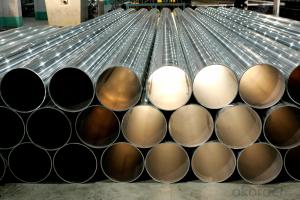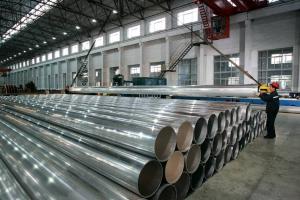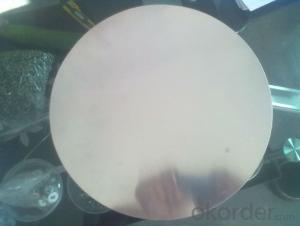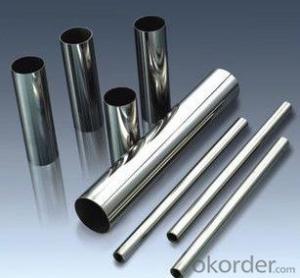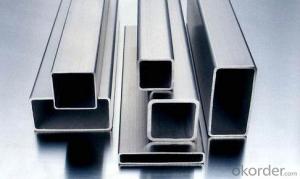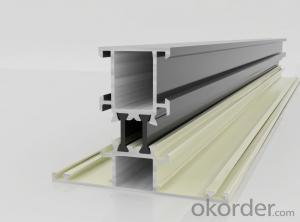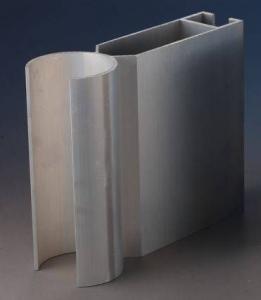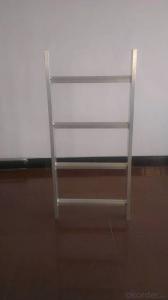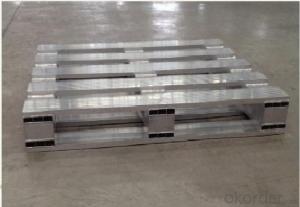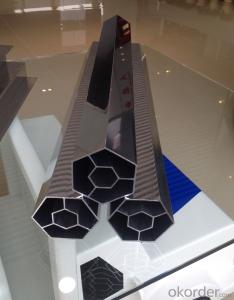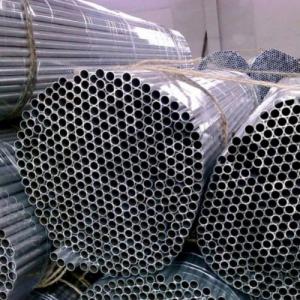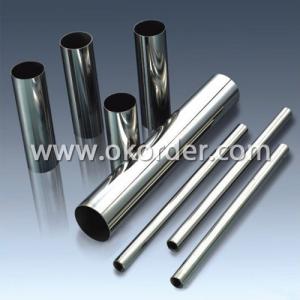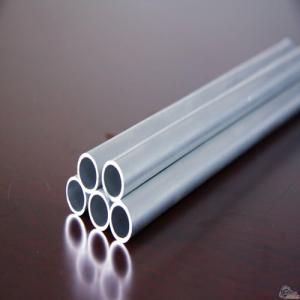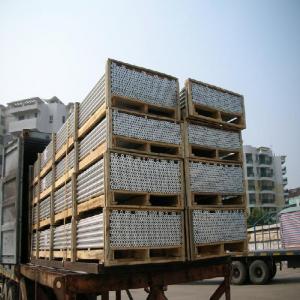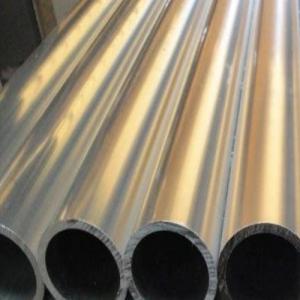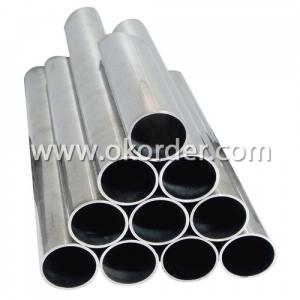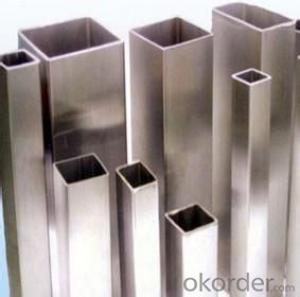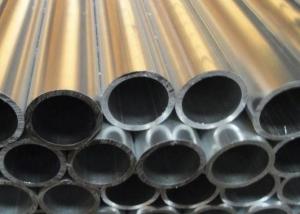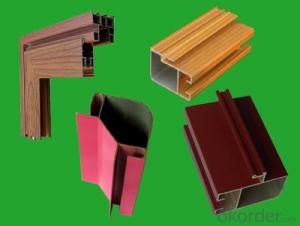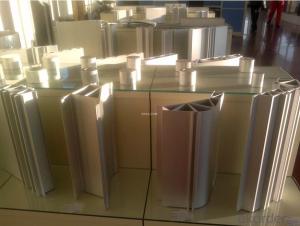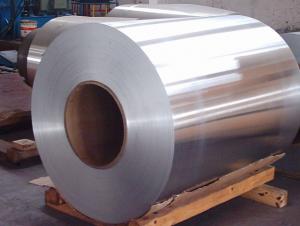Aluminum pipes
OKorder Service Pledge
OKorder Financial Service
You Might Also Like
We are the largest aluminum profilemanufacture in
Provide full size of seamed tubes(Round):
Diameter(Out):7.54mm-573mm
Wall thickness:1mm-44mm
Material | Alloy Aluminum 6063,6061,6005,6082 or customer nominated |
Temper | T3, T4, T5, T6 and other |
Surface | Anodize, electrophoresis, powder coating, PVDF coating, wood grain painting, etc. |
Colour | Any colour based on Standard Germany RAL Mark |
Length | Not more than 16 meters |
Good Package | Inner plastic film /outside carton/wooden pallets |
Payment Method | T/T, L/C, etc |
Delivery Time | Normally 2-4 weeks, Delivery time can be consulted. |
Press Machine | 500-12500 tons all together 93 press lines. |
Fabrication | 1. Furniture 2. Drilling; 3. Bending; 4. Cutting; 5. etc. |
Certificate | ISO/TS 16949,DNV,IRIS,CCS,AFA,etc. |
Dies | 1. Using our dies, no fee; |
2. Using customer drawing, opening dies, usually about 5~50 tons then the dies cost can be refunded. | |
3. Die cost is negotiable base on the order quantity | |
Capability | Annual output 800,000 tons |
- Q:I have a meter square radiator (copper tubes, aluminum tubes are), I would like to know how to remove the scale inside, looking forward to your master answer 5Do you need any chemical reagents?heyHow do you handle the copper tube and the aluminum tube separately?
- Comrade hydrochloric acid can be, but do not have a long time, or else the aluminum pipe is gone, ha ha!
- Q:What's the difference between 6061 tubes and 6063?
- If a certain amount of manganese and chromium, can neutralize the bad effect of iron; sometimes add a small amount of copper or zinc, to improve the strength of the alloy, and the corrosion resistance decreased significantly; there is a small amount of copper conductive materials, titanium and iron in order to offset the adverse effects on the conductivity of the zirconium; or titanium recrystallization grain refinement and control;
- Q:Are aluminum pipes lightweight?
- Yes, aluminum pipes are lightweight.
- Q:Can aluminum pipes be used for roller coaster constructions?
- Yes, aluminum pipes can be used for roller coaster constructions. Aluminum is a lightweight and durable material that can withstand the stress and forces exerted on roller coasters. Its corrosion resistance and flexibility make it suitable for various roller coaster components, such as supports, tracks, and safety restraints.
- Q:Are aluminum pipes suitable for oil refineries?
- Yes, aluminum pipes can be suitable for oil refineries, depending on the specific requirements and conditions of the refinery. Aluminum pipes offer several advantages that make them a viable option for certain applications in oil refineries. Firstly, aluminum pipes are lightweight, which makes them easier to transport, install, and handle within a refinery facility. This characteristic can reduce the overall cost and time associated with the installation and maintenance of the piping system. Secondly, aluminum has a high corrosion resistance, especially when exposed to air. This quality is crucial in oil refineries where the pipes come into contact with various corrosive substances, such as crude oil, petroleum products, and chemicals. The resistance to corrosion helps prolong the lifespan of the pipes and reduces the need for frequent replacements or repairs. Additionally, aluminum pipes have excellent thermal conductivity. This property allows for efficient heat transfer within the refinery processes, which is essential for operations such as distillation, catalytic cracking, and oil separation. The high thermal conductivity of aluminum pipes can contribute to improved energy efficiency and cost savings. However, it is important to note that aluminum pipes may not be suitable for all applications in oil refineries. For instance, they may not be ideal for carrying highly pressurized fluids or in situations where high temperatures are involved, as aluminum has lower strength and melting point compared to other metals like steel. In such cases, steel or other alloys may be more appropriate. Overall, the suitability of aluminum pipes in oil refineries depends on the specific requirements, conditions, and limitations of the refinery processes. It is crucial to assess the compatibility of aluminum pipes with the operational needs of the refinery, taking into consideration factors such as pressure, temperature, and the nature of the fluids being transported.
- Q:Eddy current demonstrator's working principle: why does the magnet fall at different speeds in different aluminum tubes, while the aluminum tubes are the same?
- When the aluminum block falls, no magnetic flux is produced, so the aluminum block falls short. When the magnet and the conductor block have relative motion, eddy currents will be generated in the conductor, and the action of the eddy current will hinder their relative motion.
- Q:Are aluminum pipes more expensive than other materials?
- The price of aluminum pipes can fluctuate based on a variety of factors, leading to variations when compared to other materials. Generally, aluminum pipes are a more budget-friendly option when compared to materials such as stainless steel or copper. However, they might be pricier than materials like PVC or galvanized steel. Furthermore, the cost of aluminum pipes can also be influenced by factors such as pipe size, thickness, manufacturing methods, and supplier. To determine the cost-effectiveness of aluminum pipes for your intended use, it is crucial to consider your specific requirements and budget.
- Q:Are aluminum pipes suitable for chemical processing plants?
- Depending on the specific requirements and conditions of the plant, aluminum pipes can be a suitable option for chemical processing plants. They offer several advantages in this application. Firstly, aluminum is lightweight, making it easier to handle and install compared to materials like steel. This can help reduce labor and transportation costs during installation. In addition, aluminum pipes have good corrosion resistance properties, which is crucial in chemical processing plants where exposure to corrosive chemicals is common. Aluminum naturally forms a protective oxide layer on its surface, preventing further corrosion. This layer can be further enhanced through surface treatments to improve resistance to specific chemicals. Furthermore, aluminum pipes have excellent thermal conductivity, facilitating efficient heat transfer in chemical processes that involve heating or cooling. This can lead to energy savings and improved operational efficiency. However, it's important to note that aluminum pipes may not be suitable for all chemical processing applications. They can react with certain aggressive chemicals or extreme conditions, such as high temperatures or extreme pH levels. In such cases, alternative materials like stainless steel or specialty alloys may be more appropriate. Therefore, it is crucial to thoroughly evaluate the specific requirements, chemicals involved, and operating conditions before using aluminum pipes in a chemical processing plant. Consulting with experts or engineers is necessary to determine their suitability and any necessary precautions or limitations.
- Q:Do aluminum pipes require insulation?
- Yes, aluminum pipes generally require insulation to prevent heat transfer, condensation, and energy loss.
- Q:Are aluminum pipes resistant to chemicals?
- Yes, aluminum pipes are generally resistant to many chemicals due to their corrosion resistance properties. However, certain highly alkaline or acidic substances may still cause damage or corrosion to aluminum pipes over time.
1. Manufacturer Overview |
|
|---|---|
| Location | |
| Year Established | |
| Annual Output Value | |
| Main Markets | |
| Company Certifications | |
2. Manufacturer Certificates |
|
|---|---|
| a) Certification Name | |
| Range | |
| Reference | |
| Validity Period | |
3. Manufacturer Capability |
|
|---|---|
| a)Trade Capacity | |
| Nearest Port | |
| Export Percentage | |
| No.of Employees in Trade Department | |
| Language Spoken: | |
| b)Factory Information | |
| Factory Size: | |
| No. of Production Lines | |
| Contract Manufacturing | |
| Product Price Range | |
Send your message to us
Aluminum pipes
OKorder Service Pledge
OKorder Financial Service
Similar products
New products
Hot products
Hot Searches
Related keywords
